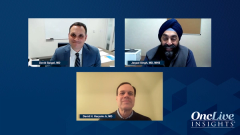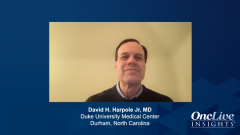
Therapies Targeting Specific Molecular Alterations in NSCLC
A panel of distinguished experts discuss how detection of actionable mutations affect their treatment choices in non-small cell lung cancer.
Episodes in this series

Transcript:
David Spigel, MD: Let me swing this to you guys. Today, I got called by a colleague who had what they thought was early-stage cancer. I hadn’t seen the patient yet, he was asking me if I could help. When they got to surgery, he said [there was] a tiny amount, I guess a microscopic amount of disease, and an N2 node, and that’s it. Technically it was a stage III cancer at the time of surgery. He was asking what more we should do. I told him I didn’t think there was an indication for radiation, and we talked about the benefits of adjuvant chemotherapy. I said, “Are you going to ask me about EGFR?” He goes, “I’ve got one better for you. The patient came back with a BRAF V600E mutation.”
This comes up [sometimes]. In stage IV cancer, we know very well that there are 7 other targets besides EGFR that we have therapies for. It’s important for this session that we’re doing with potentially a global audience here that there’s no indication for any adjuvant TKI [tyrosine kinase inhibitor] use outside of EGFR at this point. We’re waiting for additional information from ongoing cooperative group adjuvant studies to know what to do for other alterations, like ALK, for example.
I’ll throw it back to you guys. Dr Singh, in this case, the patient’s EGFR status was unknown. What are you doing when I call you up and say we didn’t get enough tissue, or for whatever reason EGFR status wasn’t tested? How do you usually respond to that or address that?
Jaspal Singh, MD, MHS: If it makes a difference to your treatment options, obviously I don’t offer that treatment myself in my discipline, but if that was something you needed, we’re here to serve. That’s what the pulmonologists do basically. We say, “We can get this to you.” If we can get enough information to you safely and expediently, then I think we will likely try to help you as quickly as possible.
David Spigel, MD: David, do you know if your team runs it on the biopsy that Dr Singh [would do]? Or do you wait and just do it on the specimen you take out?
David H. Harpole Jr, MD: It depends on what we’re thinking about. For an isolated lesion like this, we probably would only do it on the latter. For anything more than this, as Dr Singh pointed out, where we’re looking at other levels, invasive stages and stuff, we very likely may run the EGFR. We often do that as a single mutation panel just for that 1 test right now, and we’re doing it up front from a biopsy, as opposed to some sort of next-generation sequencing group. But I think this is changing and evolving very rapidly.
Transcript edited for clarity.





































